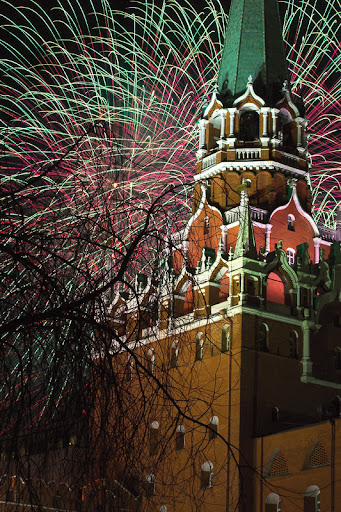
It was the height of glasnost and perestroika, and Mike Bigornia (late, great and sorely-missed friend and poet) and I grabbed the chance the first time we got when the Soviet Writers Union sent invitations for an exchange visit. That was July 1989, we had just taken over the reins of the local counterpart organization, the Unyon ng mga Manunulat sa Pilipinas (UMPIL). Mike was Chairman then and I was Secretary General, replacing Virgilio S. Almario and the late, much-loved, Alfrredo Navarro Salanga respectively. It was my first trip abroad (so far from home, but excited to be away halfway around the world), I was in-between jobs, newly-redundanced from my government work, before I joined the advertising industry, where I would work for the next 14 years.
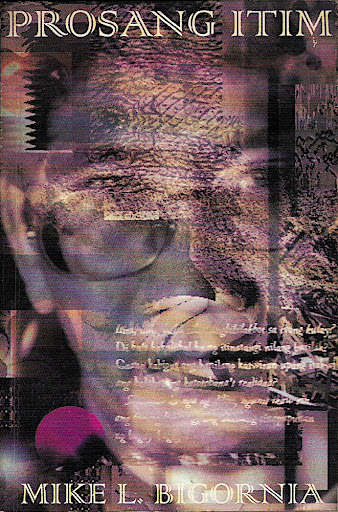
Mike Bigornia on the cover of his book, Prosang Itim (Black Prose), designed by Fidel Rillo.
In this time of “openness” and “restructuring,” there was a thrill in the air in the three cities we visited: Moscow, Leningrad (now St. Petersburg again), and Kiev. Still, beer was being rationed (people lined up at 7 o’clock in the morning at the tap of tank-trailer, bringing bottles and damajuanas to be filled with the precious brew, and there was only one kind and shape of soft drink bottle for all brands, but books, even in English translation, were cheap). Most of the bigger names of the Soviet Writer’s Union were summering in their dachas (so we didn’t get to meet them) but we were hosted well in the three cities. We soaked up the sites, sampled the food, visited the museums and—at the end of the day (white night actually, it was late summer)—our main guide, Dmitri, for our whole stay, or Vladimir in Kiev, deposited us back at the hotel and we were left mainly on our own. Although, in Kiev, Vladimir never "deposited" us back to our hotel but got drunk with us in his flat before taking us back towards dawn. Thus the germ of these poems stirred vaguely in my mind, I was able to start writing about my Russia experience only a year after. It was also the time I was fond of the long rambling line, the meditative journalizing, the embroidery of threads and colors that could create shapes that sometimes surprised even myself… thus, too, the tentative “Notes” in the title.
I thought to feature these poems here, from my second book, Poems en Route (University of Santo Tomas Press, 1998), only because I found in the Net fantastic pictures that reminded me of that trip. They are not, of course, of the Russia I saw 12 years ago. The architecture may not have changed much (and not much physical change is visible), but they reflect something entirely different, something perhaps that is happening to the culture, after the mantle of Soviet hegemony had gone. One thing, though, that stays through the centuries is the Russian's umbilical link to his religion, despite the socialist denigration of it, how Russia is not what it is without its Orthodox Church. It is part of her landscape, the interior one as well as that which is the subject of these pictures.
I dedicate these poems to our two guides, Dmitri and Vladimir who, as much as they could, became our friends and not just our guides. Tall and bespectabled Dmitri, who looked like he was fresh from university, and though conscious about his work was always smiling. And fiery Vladimir, quick to offer vodka, beer and ice cream, in that order, fervent Ukrainian nationalist. I have no way of knowing how they had fared in the perturbing times their country went through, or where they are now. May they have realized the dreams, for home and country, that they shared with us. And to Maxim Popykin, photographic artist, who lent me his pictures and reminded me of his great nation.
These magnificent pictures by Maxim Popykin I saw featured on Maurice Oliver’s serendipitous online literary magazine, Concelebratory Shoehorn Review. (Some of my newer poems were featured there in January 2008, the month after Isaw Maxim's pictures.) This is the Russia as seen from Mr. Popykin’s skilled camera lenses, and his artistic eagle eyes. I visited Maxim’s site at PBase.Com and sought his permission to use these pictures, on referral by Maurice, and Maxim answered my mail, “I will be happy if you use my pictures (whatever your like) on your blog! You don't have to get permission in the future, it's pleasure for me to share my work with a lot of people around the Globe.” This while apologizing for his English, to which I wrote back, “Don't worry about the English (I wish I knew Russian!)—your great pictures are appreciated in any language!” Maxim’s bionote is found in the photo credits at the end of this posting (page 2).
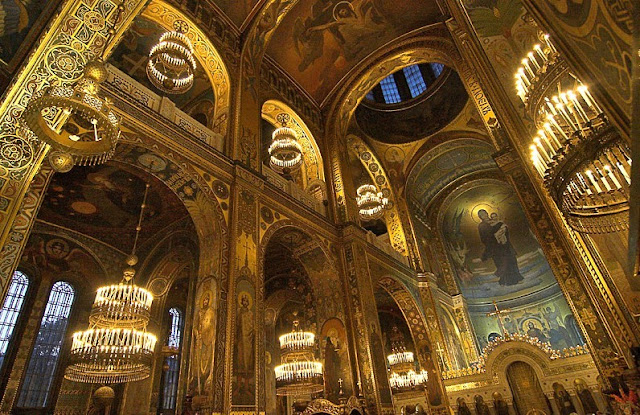
Notes on a Tourist’s Russia
for Dmitri and Vladimir, able guides; and Maxim, photographerI. Kiev
Red as flesh in an open wound,
Bricks gaze up from a gash in the asphalt
Down an avenue in Kiev.
Intent as the memory of ages they keep,
Preserved by state edict, they crunch
Under our tires as we speed
Toward the museums of the Vladimirs.
Cities lie beneath this city. Or beside.
Streets intersect, entwine, run parallel,
One below or before the other,
In mirror images, in simultaneous existences:
As the crystal blue of the Dnieper
Cuts between the old capital and the new
District of clustering towers
Of the proletarian housing dream,
Each looks across to the shimmering
Reflection of its twin.
Even our guide is called Vladimir,
And no heady vodka can assuage
The ache that history awakes in him:
It derives from the darkest reaches
Behind the stare of ikons, the sky
Of the Ukrainian steppes, the loneliness
Of siege towers when Rus awaited
The Golden Horde at the gates.
Other hordes have since then ridden down
These brick and cobbled roads, other tyrannies.
Even state edifices and their marble silences
Impose an awe, demand a different sanctity.
I, privileged catechumen, genuflect
Before the varied cathedrals of destiny:
I hear Mussorgsky in the feudal hall
Behind the oaken portcullis of Golden Gates,
The wail of peasants in the ululating
Chorus of folk sopranos, and echoes drowning
In the pottery imbedded in the mortar
Of St. Sofia’s, where ancient fires burn wax
On gilt candelabra, and Yaroslav the Wise
Sleeps like a spider in his sarcophagus.
In jest, history has let a giddy farm swine
Leave his hoofprint on the plinfa,
As the fool’s gold of the mosaic pieces
Dazzled the avid minions of Khan Batu.
I am dazed as I descend the winding turns
Of Andreyevsky Street and gaze back
At the green cupolas of St. Andrew’s.
So is the stranger in his own moment
Of light more intimate with the ghosts
In the house of his hosts:
They stand clearer before him,
More at ease, less circumspect.
For there is no bad blood between,
Nor recrimination, nor ageless pain.
Only the comfort of distance,
The pleasure of mutual surprise.
Marne L. Kilates
(1990)
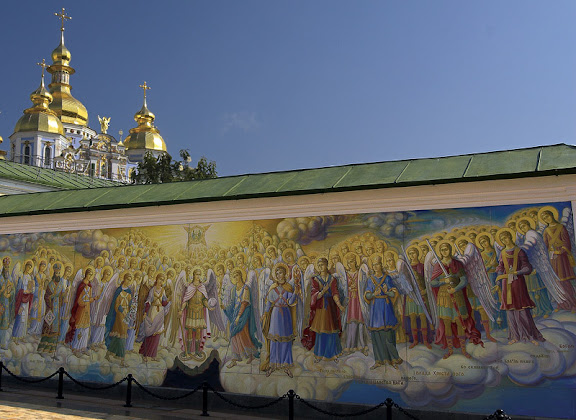
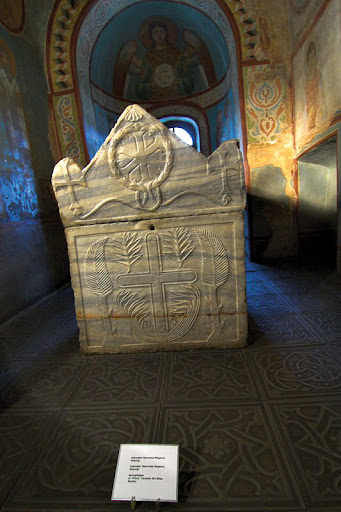 PHOTOS by Maxim Popykin, from top: Spassky Tower fireworks, Moscow, 2007; in Kiev: Vladimirsky Cathedral, Mikhailovsky Monastery, sarcophagus of Yaroslav the Wise inside Vladimirsky church
PHOTOS by Maxim Popykin, from top: Spassky Tower fireworks, Moscow, 2007; in Kiev: Vladimirsky Cathedral, Mikhailovsky Monastery, sarcophagus of Yaroslav the Wise inside Vladimirsky church✑



No comments:
Post a Comment